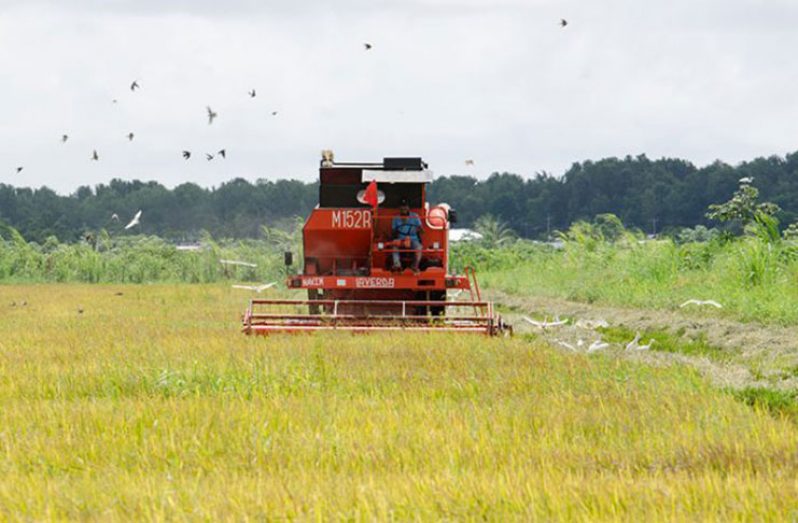…economist says Guyana should become ‘lead producer’ amidst COVID-19 pandemic
…experts agree that improved intra-regional trade imperative
GUYANA’s potential of becoming the “breadbasket” of the Caribbean has once again come under the spotlight as regional experts seek out solutions to ensure the demand and supply shocks associated with the COVID-19 pandemic do not adversely affect food security in the region.

The novel coronavirus– COVID-19– and its resulting pandemic has led to an “unusual occurrence” of a global, dual demand and supply shock, according to Economist at the Caribbean Development Bank (CDB), Ronald James, at a recent youth forum.
The Food and Agriculture Organization (FAO) has highlighted that the measures used to mitigate the spread and effects of COVID-19, including border closures, quarantines and market, trade and supply chain disruptions, have limited access to “sufficient, diverse and nutritious” sources of food.
During the medium to long term, as economies contend with the loss of productivity, increase in unemployment and other economic impacts of COVID-19, the FAO said that countries, particularly those which depend on food imports, will face difficulties in buying food.
“But there is no need for the world to panic,” the FAO said, however, “Globally, there is enough food for everyone.” The challenge remains, however, in logistics and the outcome of the continuing pandemic.
Meanwhile, in the Caribbean, James explained that the outbreak has led to a sharp, but temporary decline in domestic consumption, and a weak demand in other economies due to its effects on trade and trade production linkages.
In the short term, the loss of tourism (a major income earner for numerous Caribbean countries) has led to a decrease in the demand for food imports, which has helped to offset the reduced supply of those imports. Food security in the Caribbean has not been destabilised; atleast, not yet.
Caribbean Agricultural Research and Development Institute (CARDI)’s Executive Director, Barton Clarke, cautioned that the indefinite continuation of the pandemic, exacerbated by the droughts in April and predicted active 2020 hurricane season will “put the region’s agri food supply chains on a precarious footing.”
This threat of a “precarious footing” has led regional experts to seek out solutions to safeguard against the potential ill-effects of the loss of productivity caused by the COVID-19 pandemic. Amidst those solutions was Guyana.
Food security and Guyana
Agriculture forms a significant portion of Guyana’s domestic production (recorded at 12.73 per cent in 2018, by the World Bank). The country has vast natural resources which augur well for a thriving agro-sector.
Amidst the pandemic, assurances that Guyana is food-secure have come from the Minister of Agriculture, Noel Holder and the Director of the National Agricultural Research and Extension institute (NAREI), Dr. Odhu Homenauth.
According to Dr. Homenauth, there has been no decline in the production of fruits and vegetables in the first quarter of the year (January to March). And, the Minister posited that neither crop nor livestock farming were adversely affected.
However, Guyana’s first case of coronavirus was recorded in the second week of March, and the precautionary measures were implemented thereafter. While speaking to the Guyana Chronicle in May, Dr. Homenauth indicated that there has been a decrease in the exportation of some commodities, especially to the US and Canada, owing to the reduction in air cargo.

Rice exports to European markets, particularly Italy and France, were affected too but the Guyana Rice Development Board (GRDB)’s General Manager, Nizam Hassan, indicated that this was offset by the approximately 40 per cent increase in exports to Latin American countries; Venezuela in particular.
While the restrictions to air cargo affect Guyana’s exports, it also negatively affects the imports of Guyana, and the Caribbean. This scenario becomes interesting, at least for Guyana, because the country has been continuing trade with the Caribbean and Latin America via water transport.
Interestingly also, this also points to a wider opportunity for Guyana to expand upon its intra-regional export capabilities.
“The world and COVID-19 has given Guyana the opportunity to preserve its status as a food producer and exporter and expand on that status,” says Trinidadian Economist, Dr. Roger Hosein. According to him, the global demand for food is likely to increase in the medium term, because of the pandemic, and as such, he advised that Guyana focuses on the opportunities for expansion.
Not another ‘missed opportunity’
In a recent CARICOM Today article, Specialist in International Trade Policy and International Politics, Elizabeth Morgan, reminded that while the Caribbean continues to have an expensive import bill– which was projected to be some US$5B in 2020– Belize, Guyana and Suriname, countries with extensive natural resources, could supply large quantities of agricultural products.
However, the still “ambitious” goals of the advancement of regional integration through the Caribbean Community (CARICOM) and, in this context, devising and implementing a community agricultural policy limits the scope of intra-regional trade.
Among other hindrances, Morgan wrote, “It was possible for a country to import fruits, vegetables and poultry from third countries but not from another Member State.” Indeed, as expressed by Morgan, this points to the conundrum of “missed opportunities”.
Dr. Hosein acknowledges too that Intra-Caricom trade has “great potential” and posited, “I think that Guyana should acknowledge it, endorse it, and take up the role of becoming the lead producer of food many times over within the Caribbean.”
Guyana’s potential as the regional breadbasket has been iterated time and time again; COVID-19 only presents a new avenue for Guyana to capitalise on its longstanding potential. Capitalising on the opportunities manifesting now, however, is easier said than done.
There are a few solutions that can help Guyana increase its role in food security for the region, though.
Among these solutions, Dr Hosein suggested that Guyana focus on improving its ‘Ease of Doing Business’. The World Bank’s ‘Doing Business’ report placed Guyana at 134 out of 190 countries; quite a dismal ranking. If successful in improving this ranking, thereby making it easier for firms and entrepreneurs to do business in Guyana, the Trinidadian economist noted that greater private and foreign capital injections should be expected. This is particularly important as the country looks to encourage investments outside of its burgeoning petroleum sector, in an attempt to stave off the dreaded ‘Dutch disease’.
To ensure that agriculture remains competitive and profitable also, he suggested that capital be readily available to this sector. Capital would help to ensure that supply chains function efficiently, and would allow for the mechanisation of the sector, which should lead to more efficient production. This should also be used to improve cost quality and reliability standards in the sector.
Importantly, he emphasised that an ample supply of labour is imperative to the success of the sector since agriculture is a labour-intensive sector. Currently, the Bureau of Statistics estimates a 56 per cent local labour force participation rate, which is fairly low compared to the rest of the region. To this end, he advised that agricultural work should be incentivised, and wages be kept competitive to mitigate the possible migration of workers into the petroleum, or petroleum-related industries.
Regional Effort necessary
Even though Guyana may better position itself by improving in these few areas, on the other hand, the Caribbean region has to become more facilitative to intra-regional trade too.

“(The COVID-19 pandemic) is perhaps one of those times when we really, really have to look at regional integration,” CBD’s James stressed. “I think we are stronger together.”
Already, Minister Holder related that CARICOM was actively examining re-opening international borders among its Member States, as a means of lending support to each other during the coronavirus pandemic. And, at a special session of the Council for Trade and Economic Development (COTED), where Ministers of Agriculture from across the region met in April, a regional response framework was agreed upon for the availability and access to food. An action committee on food and nutrition security was established as well.
Minister Holder advised that Guyanese farmers “gear up” for increased production and potential exports, cognisant of the regional developments.
However, as Morgan pointed out in her article, many opportunities for food security and greater intra-regional trade have appeared before, and over the years it has seemed that CARICOM leaders have lacked the political will to “take bold actions” that would lead to the success of the ambitious, but necessary, regional integration agenda. Essentially, she questioned whether the current pandemic would be the one to galvanise and actualise this agenda.
Nevertheless, Dr. Hosein related that food prices will not decrease in the medium-term as many nations may either start to keep some of their food supplies to themselves, or may even be forced to halt production, due to the pandemic. Inevitably, global supply and demand will be affected.
“And because the supply of food from foreign countries to the Caribbean will fall, Guyana can fill some of these niche gaps that will emerge,” Dr. Hosein posited.




.png)









